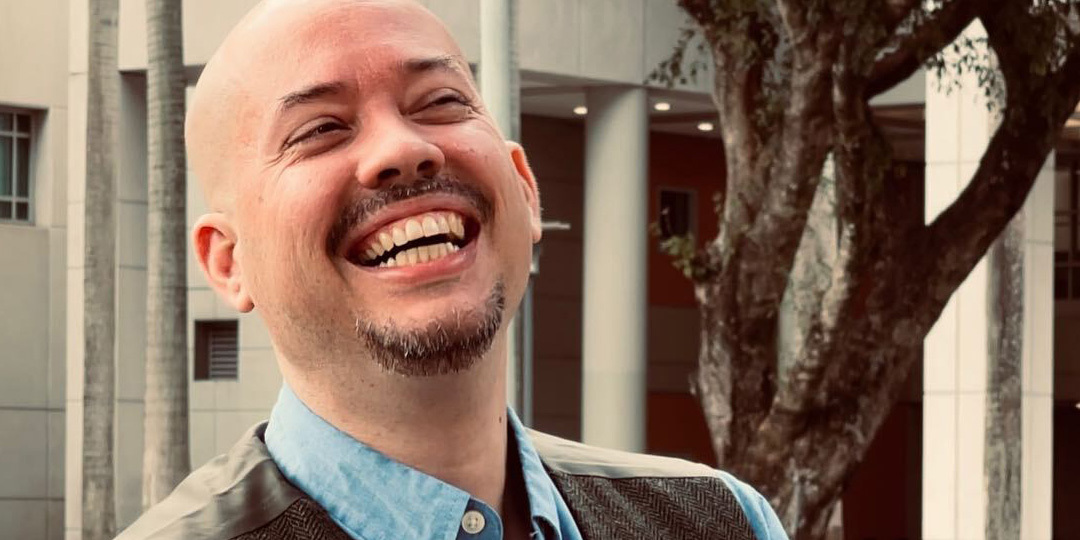Degree Title
Bachelor of Arts
Summer A 2024 Start Date:
May 6, 2024
Summer B 2024 Start Date:
June 17, 2024
Overview
The bachelor’s degree in English: Literature Track has an emphasis on multicultural approaches to literature within and beyond South Florida. Our definition of “literature” is vast: it includes not only novels, poems, and plays, but also comic books, films, oral traditions, and much else. This flexible definition allows us to study diverse authors. Our faculty are experts on classic figures such as Shakespeare, Sor Juana Inés de la Cruz, Herman Melville, Virginia Woolf, and Toni Morrison. We also highlight marginalized authors such as Olaudah Equiano, an enslaved African writer, traveler, and abolitionist; indigenous groups dating from time immemorial; various immigrant, exile, or diasporic figures such as Jewish-American writer Anzia Yezierska; and queer artists of diverse sexual and gender identities. Overall, our students are respected as learners whose own diverse backgrounds and varied professional aspirations guide the program’s aims and offerings.
Those who enjoy reading, discussing, and writing about literature will learn much in the literature track, available as a major or minor. Students study multiple time periods and genres, deeply engage with creative works, and learn to think theoretically about literature, language, and society. Our faculty harness online learning’s strengths— including accessible course designs, flexible course schedules, and digital discussion tools— to maintain literature’s humanistic spirit. Our majors build virtual communities alongside their peers as well as faculty dedicated to online learning. Our majors also craft their own varied texts, including research papers, multimedia presentations, and group projects that foster their understanding of global cultural traditions and diverse lived experiences. Undergraduate Certificate Programs in Exile Studies and Film Studies are housed in Literature, while our courses regularly satisfy requirements in Queer Studies, Women’s and Gender Studies, Health Humanities, Environmental Studies, Law, Ethics, and Society, and many other FIU Certificate Programs. This specialized course of study provides the means to discover how literature offers a conduit for contemporary thought, historical narratives, and cultural movements.
Our students develop the language, communication, and cultural competency to work in a variety of fields. Employers across the country and around the world are looking for grads who can think critically, communicate effectively, understand diverse cultures, and write clearly—exactly the skills you learn from within the literature track.
-
Why Apply?
Despite the myths, the truth is that the large majority of jobs aren’t limited to graduates in a single subject. Employers everywhere know that English majors and minors can:
- see the big picture
- think critically and creatively
- write clearly and forcefully
- manage complexity
- conduct research and analyze data
- understand diverse cultures
- approach problems imaginatively
The specialized literature track prepares you for careers in many fields, including law, education, publishing, advertising, and dozens of others. Any employer who values imagination, cultural understanding, clear expression, and analyzing complex information welcomes English majors.
Every big corporation employs thousands of arts and humanities grads. And countless nonprofit organizations—museums, charitable foundations, organizations like Greenpeace and Doctors without Borders—rely on arts and humanities majors to be curators, to educate the public, to write grant proposals, and to advance their missions.
English majors and minors have an edge over students with pre-professional degrees: the jobs they get are less subject to fluctuation in the economy, and the skills they learn serve them throughout an entire career—they don’t “go stale” when a new technology comes along. In fact, according to one recent study, humanities grads actually have a lower unemployment rate than those with degrees in math and computer science.
Salary surveys also contain surprises. Forbes notes that, while pre-professional majors earn more on graduation, humanities majors end their careers earning an average of $2,000 more each year. And you don’t have to wait for retirement to be rewarded. A GlassDoor survey of salaries five years after college graduation finds that, on average, English and History majors earn more than Environmental Science majors, Philosophy and Spanish majors out-earn Chemistry majors, and the average Music major takes home a larger paycheck than the average Psychology or Biology major.
According to the Bureau of Labor Statistics, the median wage for those with a bachelor’s degree in English is approximately $60,000 for all fields. In 2019, up to 64% of those with bachelor’s degree in English worked in the following areas (36% worked in other professions outside of those listed):
- Educational instruction and library occupations
- Management occupations
- Arts, design, entertainment, sports and media occupations
- Office and administrative support occupations
- Business and financial operations occupations
-
Courses
Common Prerequisites: 9 Credit Hours
ENC 1101 – Writing and Rhetoric I
ENC 1102 – Writing and Rhetoric II
ENG 2012 – Approaches to Literature
Upper Division Requirements: 12 Credit Hours
CRW 3010 – Creative Writing
LIN 3013, LIN 4680 – Linguistics
Multicultural Literature (African American, Jewish Literature of Exile, etc…)
Writing & Rhetoric
Literature Track:18 Credit Hours
ENG 4043, AML 3042 – Literary Theory
American Literature Prior to 1900
British Literature Prior to 1660
Upper Division Literature Courses
Electives in English Department: 6 Credit Hours
Upper division 3000 or 4000 level courses
Additional Electives: 24 Credit Hours
Students consult with advisors
*The following courses may be repeated as long as they have a change in topic:
AML3042, AML4213, AML4245, AML4606, AML4612, AML4621, AML4624, AML4930, ENL4215, ENL4930, LIT3200, LIT3313, LIT3702, LIT3930, LIT4001, LIT4023, LIT4434, LIT4536, LIT4931
-
Requirements
To ensure every student’s success, we have certain admissions requirements for each of our programs. To help you through the application process, our enrollment advisors are here to answer your questions and guide you every step of the way.
FIU Admission Requirements
Applications are accepted for Spring, Fall and Summer terms.
Steps to Apply
First Year Students
Please submit the following:
- Online application
- $30 application fee.
- Official SAT, ACT and/or CLT scores.
- Official high school transcripts.
Transfer Students
Please submit the following:
- Online application
- $30 application fee.
- Official college transcripts.
- If you have less than 60 transferable college credits, you must also submit official high school transcripts and SAT, ACT and/or CLT scores in addition to any transcripts from postsecondary schools to the Office of Undergraduate Admissions.
Returning Students
Returning students must meet the current university and degree-specific requirements to be admitted. FIU has policies for students who left FIU, please click here for more details.
Please submit the following:
- Online application
- $30 application fee
- Updated official transcripts
International Students
In addition to the above requirements, international applicants should submit:
- Official English Language Proficiency exam scores (TOEFL or IELTS).
- Official translations of any transcripts, if not in English.
- If you have less than 60 transferable college credits, you must also submit official high school transcripts with translation.
Admission Documents
To complete the online undergraduate programs admissions form, select your program from the application form. You may complete the online application and submit it, even before taking any entrance exams. All supporting admission documents may be sent to:
Florida International University Office
of Undergraduate Admissions
P.O. Box 659003
Miami, FL 33265-9003
USA
FIU also accepts transcripts electronically via:
Faster (All FL public institutions)
Naviance (Typically used by private high schools)
SMART/Joint Service Transcript – Military records
*Meeting the university minimum requirements does not guarantee admission
-
Tuition and Aid
We’re thrilled that you’re considering online education and want you to know exactly what to expect for tuition and fees. Education is an investment in your future. Use the following student tuition and fees calculator to determine your costs.
-
Top Faculty
Our department faculty are scholars in a multiplicity of fields ranging from writing studies to world literature, semantics and are also writers of memoirs, thrillers, poetry and more. Our faculty regularly earn recognitions locally, statewide, nationally and internationally.
Dr. Mark B. Kelley
Dr. Mark B. Kelley is a scholar of early American literature and culture. His research and teaching focuses on the ocean, emotions, disability, and more expansive definitions of “literature.” He has published articles on nineteenth-century card games, disability and the Ku Klux Klan, the global postal system, and Haitian revolutionaries. In support of his research, Dr. Kelley has done archival research at places such as John Carter Brown Library, Mystic Seaport Museum, Peabody Essex Museum, Library Company of Philadelphia, Providence Public Library, and the University of Virginia. He has undergone training on online pedagogy and works to create virtual classrooms that foster student interactions. Dr. Kelley strives to foster student access, an environment of radical kindness, and a mutual appreciation of literature’s enduring power. He received his PhD at the University of California-San Diego.Professor Martha Schoolman
Professor Martha Schoolman is a scholar of nineteenth-century US literature. Her teaching and research focus on the literatures of slavery and emancipation from the 1830s to the present, indigenous literatures, and environmental humanities. She is the author of Abolitionist Geographies (2014) as well as scholarly essays and reviews in a range of venues including the journals Arizona Quarterly and American Literary History and forthcoming Cambridge series American Literature in Transition and the Oxford Handbook of Ralph Waldo Emerson. She has also published personal essays in Avidly and The Revealer.Dr. Rhona Trauvitch
Dr. Rhona Trauvitch holds a Ph.D. in Comparative Literature from the University of Massachusetts Amherst. She is a scholar of science fiction, and specializes in the intersections of STEM and storytelling. She has contributed chapters to numerous edited collections, including The Routledge Handbook of Popular Culture and Tourism (Routledge, 2018), Interface between Literature and Science (Cambridge Scholars Publishing, 2015), Jim Henson and Philosophy (Rowman & Littlefield Publishers, 2015), and Literary Cartographies (Palgrave Macmillan, 2014). Dr. Trauvitch teaches face-to-face, online, and hybrid courses in multicultural literature, speculative fiction, narrative theory, and popular culture, among other subjects. She was awarded a Faculty Senate Award for Excellence in Teaching (2018), and a College of Arts, Sciences & Education Award for Teaching (2017). Dr. Trauvitch is Founding Director of FIU’s Science & Fiction Lab, and Executive Committee Chairperson of the MLA’s Linguistics and Literature forum. She is writing a book about analogous patterns in science and storytelling.Dr. Amy Kahrmann Huseby
Dr. Huseby’s research focuses on the relationship between British literature of the long nineteenth century and the representational capacity of numbers, with particular attention to questions of gender and sexuality, colonialism and imperialism, and political economy. Her research and teaching interests more broadly include poetry, prosody, and historical poetics; print culture, the history of the book, and publishing; the history of science; biopolitics, statistics, and the rise of social sciences; and aesthetics and politics. In addition to being a fellow in the Honors College, Dr. Huseby teaches undergraduate and graduate courses on the literature from and about the British empire, including such popular subjects as adaptations of Jane Austen and Brontë novels; ecological imperialism, climate change, and the anthropocene; doubles, doppelgangers, and twins; and foundations and development of genres, such as the Gothic, fantasy, and science fiction.
120 Credits Required
235.57 Per Credit Hour (In-State) + Fees
648.87 Per Credit Hour (Out-of-State) + Fees
* Total tuition and fees are subject to change.
Highlights
Fully Online Degree
Program start date: Fall term only
Become part of an exceptional community and make the most of your education. Join the Honors College.
Specialized Literature Track



